Serving 373 students in grades 6-8, Philipsburg-osceola Area Middle School ranks in the bottom 50% of all schools in Pennsylvania for overall test scores (math proficiency is bottom 50%, and reading proficiency is bottom 50%).
The percentage of students achieving proficiency in math is 23% (which is lower than the Pennsylvania state average of 36%). The percentage of students achieving proficiency in reading/language arts is 42% (which is lower than the Pennsylvania state average of 55%).
The student:teacher ratio of 12:1 is lower than the Pennsylvania state level of 13:1.
Minority enrollment is 3% of the student body (majority Black and Asian), which is lower than the Pennsylvania state average of 39% (majority Hispanic).
Quick Stats (2025)
- Grades: 6-8
- Enrollment: 373 students
- Student:Teacher Ratio: 12:1
- Minority Enrollment: 3%
- Overall Testing Rank: Bottom 50% in PA
- Math Proficiency: 23% (Btm 50%)
- Reading Proficiency: 42% (Btm 50%)
- Science Proficiency: 40-44% (Btm 50%)
- Source: National Center for Education Statistics (NCES), PA Dept. of Education
School Overview
Philipsburg-osceola Area Middle School's student population of 373 students has declined by 30% over five school years.
The teacher population of 30 teachers has declined by 31% over five school years.
Grades Offered
Grades 6-8
(offers virtual instruction)
(offers virtual instruction)
Total Students
373 students
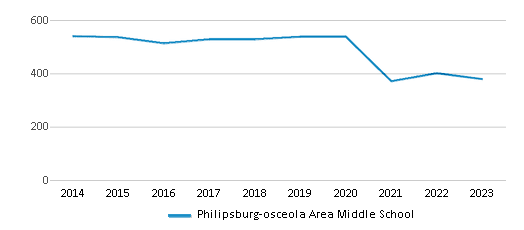
Gender %
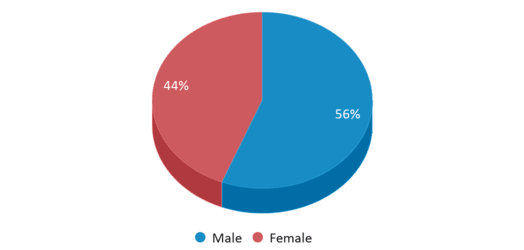
Total Classroom Teachers
30 teachers
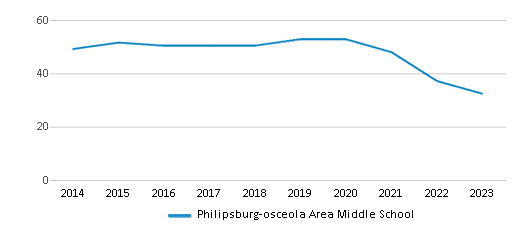
Students by Grade
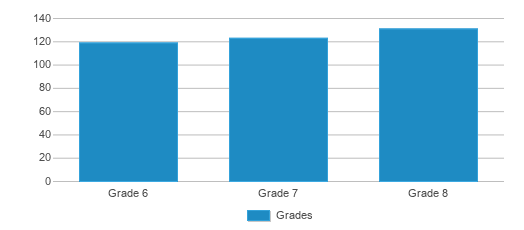
School Rankings
Philipsburg-osceola Area Middle School ranks within the bottom 50% of all 2,733 schools in Pennsylvania (based off of combined math and reading proficiency testing data).
The diversity score of Philipsburg-osceola Area Middle School is 0.06, which is less than the diversity score at state average of 0.59. The school's diversity has stayed relatively flat over five school years.
Overall Testing Rank
#2097 out of 2733 schools
(Bottom 50%)
(Bottom 50%)
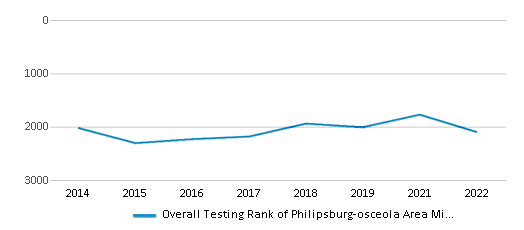
Math Test Scores (% Proficient)
23%
36%
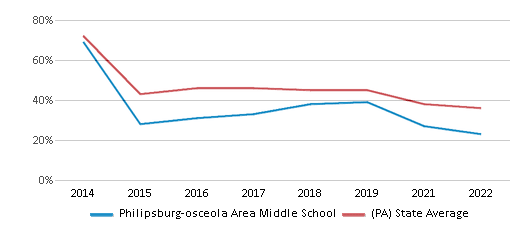
Reading/Language Arts Test Scores (% Proficient)
42%
55%
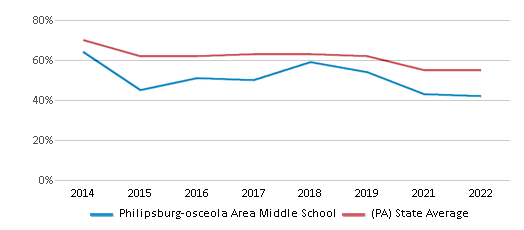
Science Test Scores (% Proficient)
40-44%
57%
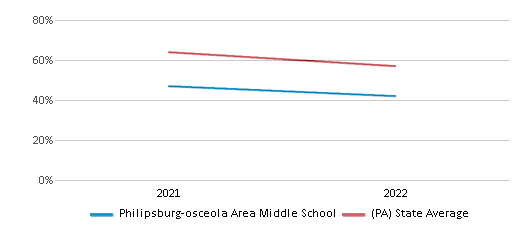
Student : Teacher Ratio
12:1
13:1
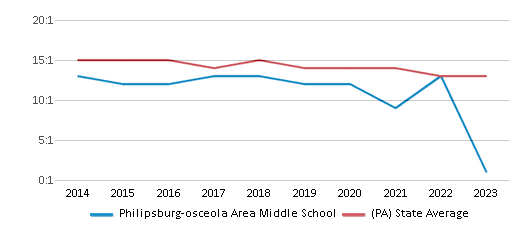
American Indian
n/a
n/a
Asian
1%
5%
Hispanic
n/a
15%
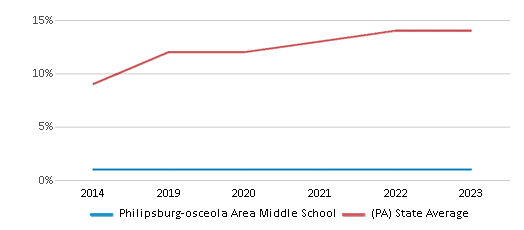
Black
1%
14%
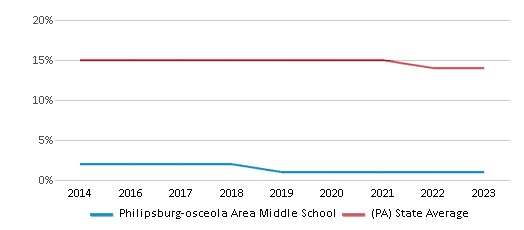
White
97%
61%
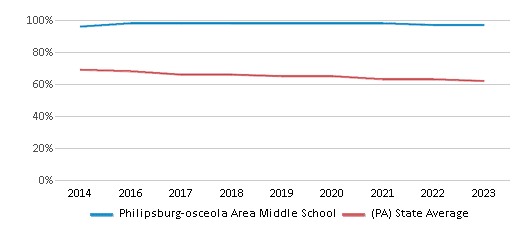
Hawaiian
n/a
n/a
Two or more races
1%
5%
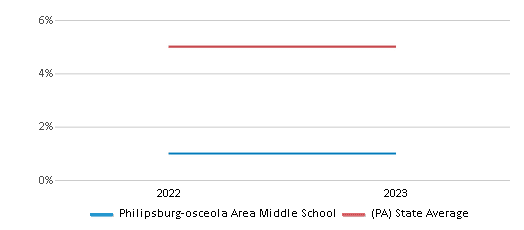
All Ethnic Groups
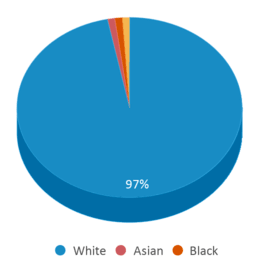
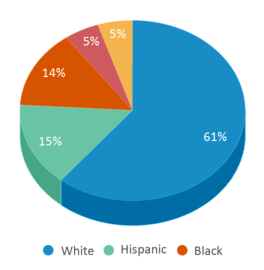
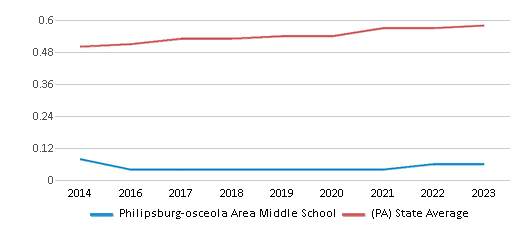
Eligible for Free Lunch
49%
60%
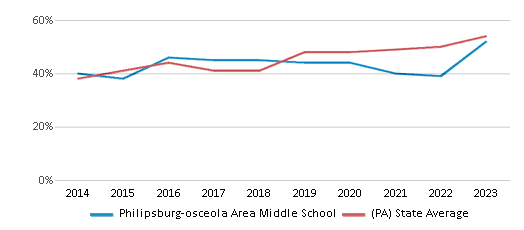
Eligible for Reduced Lunch
4%
2%
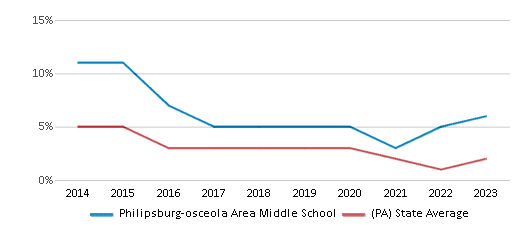
School Statewide Testing
School District Name
Source: National Center for Education Statistics (NCES), PA Dept. of Education
Profile last updated: 02/09/2025
Frequently Asked Questions
What is Philipsburg-osceola Area Middle School's ranking?
Philipsburg-osceola Area Middle School is ranked #2097 out of 2,733 schools, which ranks it among the bottom 50% of public schools in Pennsylvania.
What percent of students have achieved state testing proficiency in math and reading?
23% of students have achieved math proficiency (compared to the 36% PA state average), while 42% of students have achieved reading proficiency (compared to the 55% PA state average).
How many students attend Philipsburg-osceola Area Middle School?
373 students attend Philipsburg-osceola Area Middle School.
What is the racial composition of the student body?
97% of Philipsburg-osceola Area Middle School students are White, 1% of students are Asian, 1% of students are Black, and 1% of students are Two or more races.
What is the student:teacher ratio of Philipsburg-osceola Area Middle School?
Philipsburg-osceola Area Middle School has a student ration of 12:1, which is lower than the Pennsylvania state average of 13:1.
What grades does Philipsburg-osceola Area Middle School offer ?
Philipsburg-osceola Area Middle School offers enrollment in grades 6-8 (offers virtual instruction).
What school district is Philipsburg-osceola Area Middle School part of?
Philipsburg-osceola Area Middle School is part of Philipsburg-Osceola Area School District.
School Reviews
2 2/3/2014
The last year I attended school here was when I was in 5th grade. Not many friends my age at all, the teachers I had were nice for the most part, it had only really been the substitute teachers that would tell you to go play with the other children, that they didn't want bothered with you. I stopped attending this school, not because of a lack of friends, but because of the change in curriculum, the math program had changed when I was in 4th grade, to a different program (which shall remain nameless). This program continued until the year I had changed over to a different school.
My peers were a mixed bag when it came down to whether they were nice or not. I was going there when, if you dressed in black you were a goth, and if you listened to anything other than pop music (I.E. Disney music) and chose to have punk rock or metal on your iPod, no one would want bothered with you. Many of the girls I had been in school with had also been the kind where they always wanted to get into a fight with you because you were different.
I had been your average, run of the mill, female student, nothing too special other than my interest didn't include listening to Hannah Montana or playing with barbies, but instead included listening to Green Day or Pantera and playing music.
All things considered, I wouldn't recommend sending a kid to this school. I have been home/cyber schooled now for four years, and it has been much better. I am back up to the straight A's in school that I had been prior to the curriculum change at PO.
Review Philipsburg-osceola Area Middle School. Reviews should be a few sentences in length. Please include any comments on:
- Quality of academic programs, teachers, and facilities
- Availability of music, art, sports and other extracurricular activities
Recent Articles

What Is A Charter School?
Explore the world of charter schools in this comprehensive guide. Learn about their history, how they operate, and the pros and cons of this educational innovation. Discover key facts about charter schools, including admission policies, demographics, and funding, as well as what to look for when considering a charter school for your child.

10 Reasons Why High School Sports Benefit Students
Discover the 10 compelling reasons why high school sports are beneficial for students. This comprehensive article explores how athletics enhance academic performance, foster personal growth, and develop crucial life skills. From improved fitness and time management to leadership development and community representation, learn why participating in high school sports can be a game-changer for students' overall success and well-being.

February 05, 2025
Understanding the U.S. Department of Education: Structure, Impact, and EvolutionWe explore how the Department of Education shapes American education, from its cabinet-level leadership to its impact on millions of students, written for general audiences seeking clarity on this vital institution.





